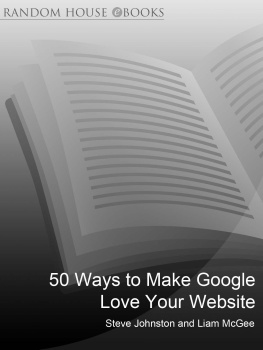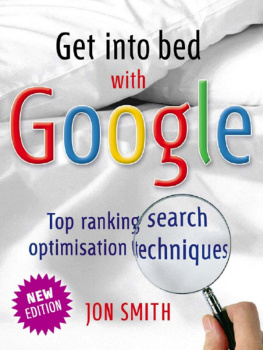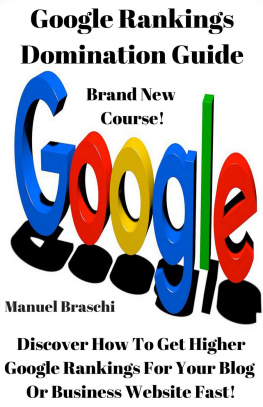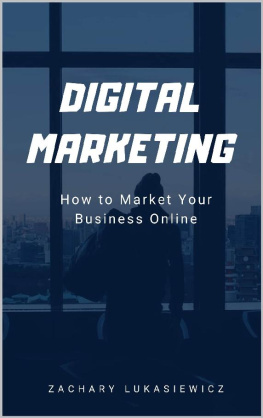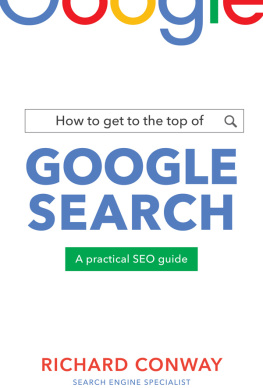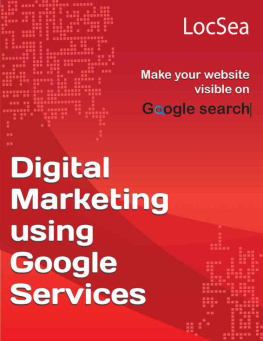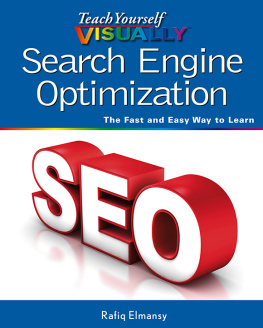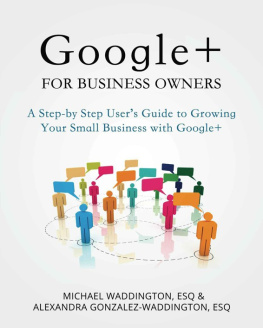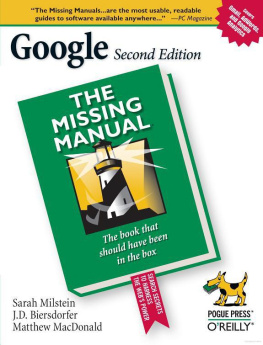About the Book
Google is now a dominant force on the Internet, guiding millions of searches and online purchases every day. Understanding how it works and how to make the most of it is therefore essential to anyone building or running a website, whether for business or as a hobby. This easy-to-follow guide explains not only how Google actually sifts the billions of pages of information its index contains, but shows you how you can improve the performance of your own website in Googles search results, giving specific and detailed instructions about the sort of priority issues you need to address.
50 Ways to Make Google Love Your Website will teach you how to:
Use Google to help you understand how people search for the sort of things you are offering
Create a website that your customers will quickly find in Google
Make your website irresistible to links from other sites
Help Google understand what your site is about
Think like Google and win more traffic
50 WAYS TO MAKE GOOGLE LOVE YOUR WEBSITE
Steve Johnston and Liam McGee

This ebook is sold subject to the condition that it shall not, by way of trade or otherwise, be lent, resold, hired out or otherwise circulated without the publishers prior consent in any form (including any digital form) other than this in which it is published and without a similar condition including this condition being imposed on the subsequent purchaser.
Epub ISBN: 9781407088754
Version 1.0
www.randomhouse.co.uk
Published by Random House Business Books 2010
2 4 6 8 10 9 7 5 3 1
Copyright Steve Johnston and Liam McGee 2010
Steve Johnston and Liam McGee have asserted their rights under the Copyright, Designs and Patents Act, 1988, to be identified as the authors of this work
First published in Great Britain in 2010 by
Random House Business Books
Random House, 20 Vauxhall Bridge Road,
London SW1V 2SA
www.randomhouse.co.uk
Addresses for companies within The Random House Group Limited can be found at: www.randomhouse.co.uk/offices.htm
The Random House Group Limited Reg. No. 954009
A CIP catalogue record for this book is available from the British Library
ISBN 9781905211258
INTRODUCTION
Well done now take a deep breath youve taken the first step: youve found our book. Now get on and read it and we promise that very soon you will feel more relaxed about making Google love your website. This is possible because contrary to much of the nonsense spoken and written about Googles search engine there are no mysteries to investigate, no black arts to dispel and no secrets to uncover. Google decides whether or not to love a site by using some very simple principles: principles that you will come to understand over the next few hours of reading, regardless of your experience or background in working with websites.
As you begin to get to grips with the way Google works, you will learn how to use these principles in the development of your own website, and you will start appreciating how changes to your site will improve Googles love of it. Some of these changes will be straightforward to make; some will be more challenging because of the time and commitment they require. None will be impossible. All will make your site more loveable to Google.
Be it a commercial site selling services or products, a not-for-profit site trying to raise the profile of an organisation, or a personal site talking about hobbies and passions, the principles of Googles love apply to your site, and your new understanding of them will mark a turning point in its management and effectiveness.
WHY IS THIS BOOK NEEDED?
Googles love is an analogy for its preference for a website within its search results. The more Google loves a site, the more often it is presented as a potentially useful site to searchers, and the more visits that site can expect as a result. And because of Googles remarkable reach it serves more than 1 billion searches every day it can regularly become the single biggest source of visitors to a website, a matter of great significance if you are trying to reach an audience or potential customers online.
Googles role in the creation of customer traffic to websites around the world makes understanding how it decides on its preferences a critical organisational issue. Googles power to make or break web businesses by the presence or lack of love for them is sufficient to justify the existence of a book such as this: a book which seeks to help you understand the nature of Googles preferences so that you can help it love your site better. There is, however, an additional reason why this book is needed: in the frontier town of Making Google Love Your Website, there are many snake oil salesmen, against whom a rational understanding of Google is your best defence.
The accepted, generic description of the services offered to help Google (and other search engines, such as Yahoo, Microsofts Bing and Ask) love your website is Search Engine Optimisation, or SEO. SEO is an acronym that you may already be familiar with, and it is one that will make frequent appearances in this book.
If you find that, despite our efforts, this book has not answered your question, wed encourage you to just google it.
WHO ARE THE AUTHORS?
Steve Johnston
Steve is an ageing inhabitant of the online frontier towns of Why Do I Need a Website, E-commerce Is Small Now, But Just You Wait and Dot-com Boom Time. Presently he is living in Making Google Love Your Website, running a small consulting practice in 1996.
It wasnt that he thought he was necessarily qualified to make such a contribution he simply couldnt help himself. He had a hands-on interest in computer technology that had begun in high school at the end of the 1970s, and he found a use for it in everything he subsequently did in business during the late 1980s and early 1990s, from networking to CD-ROMS by way of EpoS. When the web arrived, it seemed an obvious extension of computings contribution to business: already managing data and transaction processing in the background, it could now process the communication channel between consumers and business. The day he first wrestled an internet connection into life in the summer of 1994 and it really needed wrestling in those days and browsed the web page of a university lecturer in California (complete with a lovely photographic portrait of his young son) from his London suburb, is etched in his memory as a moment of real wonder. He has remained passionate about the web ever since.
Steve is also old enough to have had a pre-web career, and the call of a frontier town was irresistible then too. Having spent a couple of years as a bookselling apprentice after his time at university (studying psychology), in the following seven years he attempted to create a high street bookselling group from scratch in South London. Ultimately he wasnt successful, making a number of first-business mistakes that were largely obscured by the excesses of the boom of the late 1980s, but which were cruelly exposed by the subsequent recession.
Where Steve lacks conspicuous business success, he takes comfort in the value of experience. And yes, that was him on Dragons Den in 2006 taking a brief holiday in the frontier town of Web 2.0 User-Generated Recommendations, but that is a story for another time.

